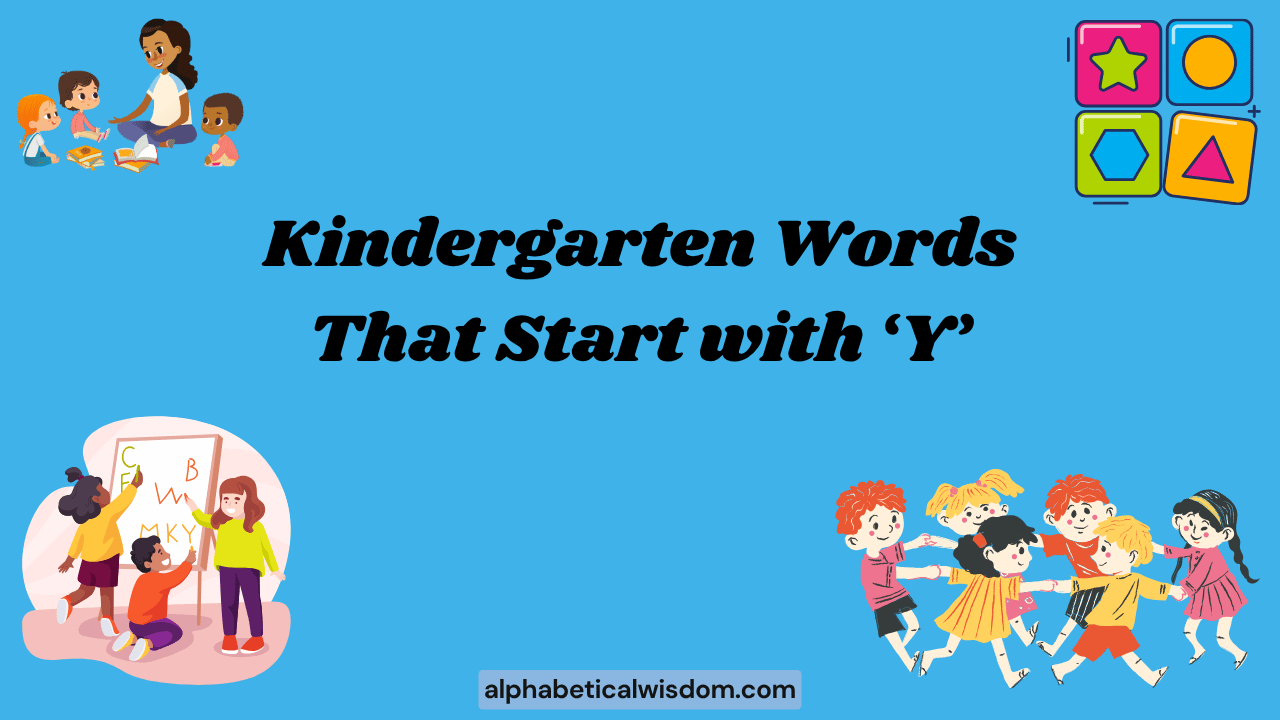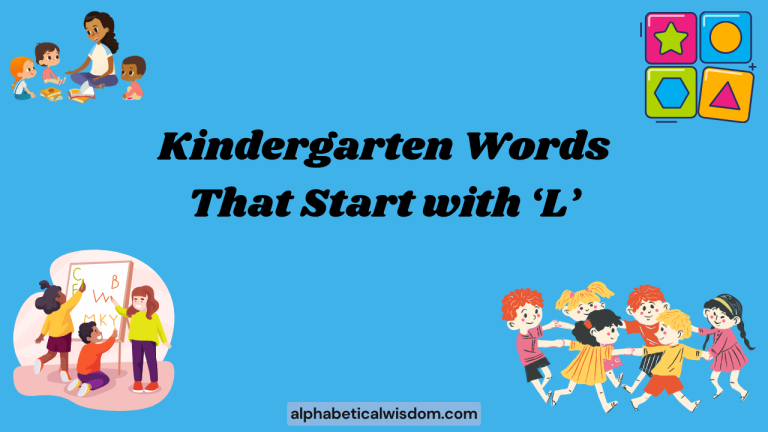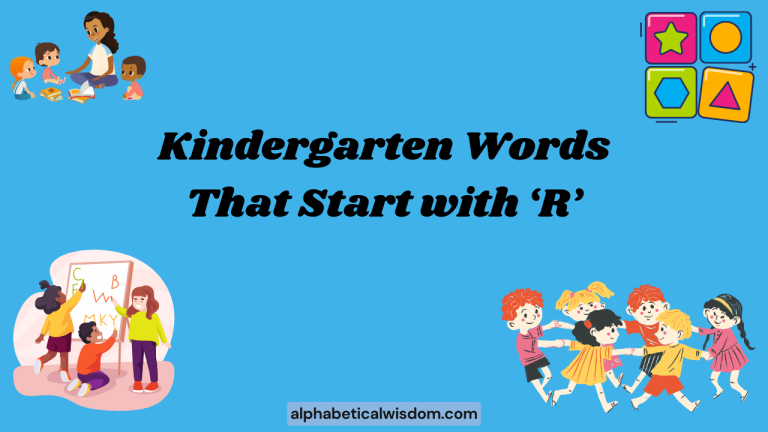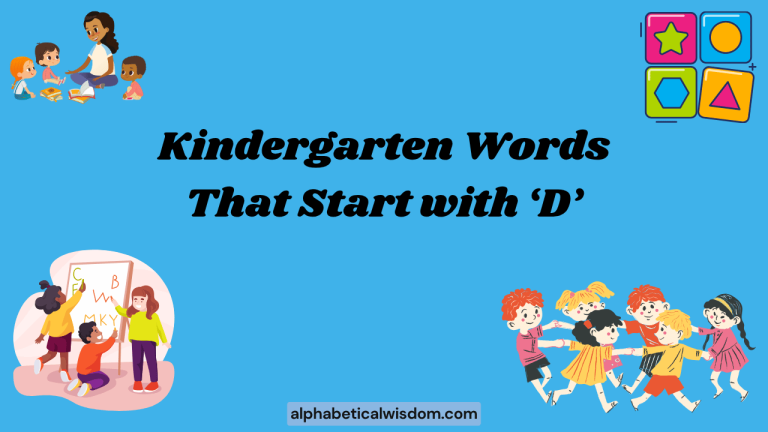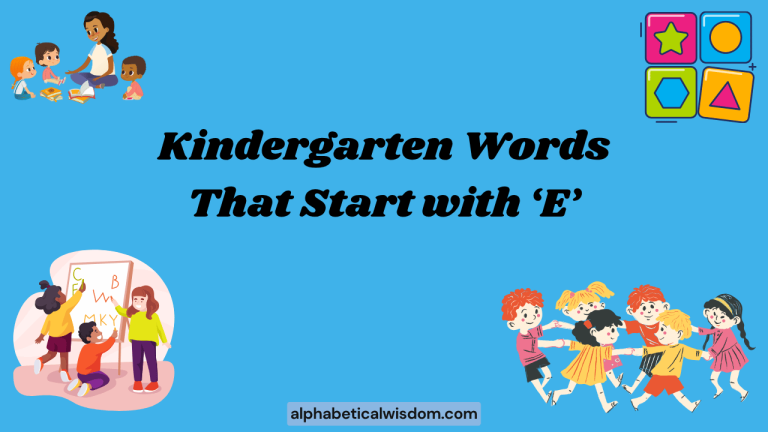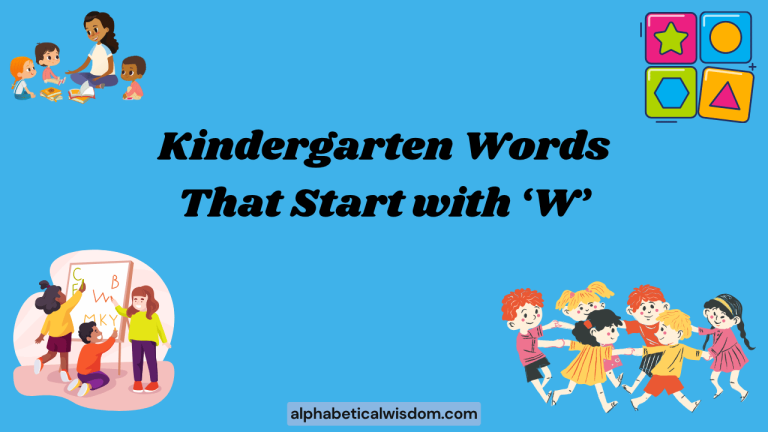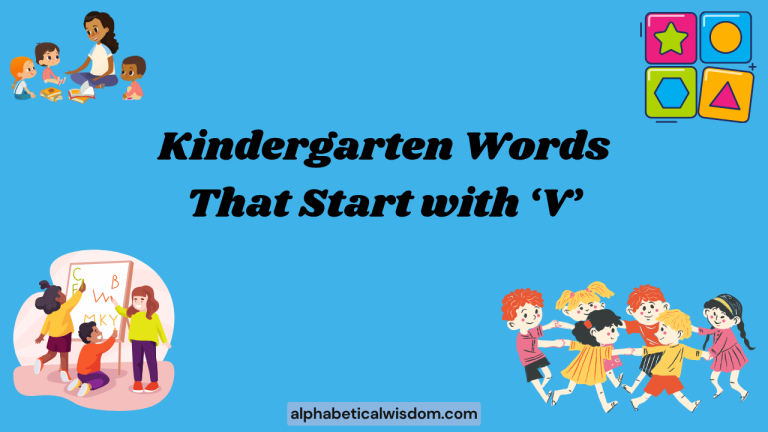Kindergarten Words That Start With Y: A Comprehensive Guide
Understanding words that begin with the letter ‘Y’ is a foundational step in a kindergartener’s language development. This guide focuses on introducing and reinforcing these words, enhancing vocabulary, and improving reading and writing skills.
Mastering these words builds confidence and prepares young learners for more complex language concepts. This article is tailored for parents, teachers, and educators who want to support early literacy skills in children.
Table of Contents
- Introduction
- Definition of Kindergarten Words Starting with Y
- Structural Breakdown of Words Starting with Y
- Categories of Words Starting with Y
- Examples of Kindergarten Words Starting with Y
- Usage Rules for Words Starting with Y
- Common Mistakes with Words Starting with Y
- Practice Exercises
- Advanced Topics
- FAQ
- Conclusion
Definition of Kindergarten Words Starting with Y
Kindergarten words starting with the letter ‘Y’ are basic vocabulary terms suitable for children aged 4-6. These words are typically simple, easy to pronounce, and frequently encountered in everyday conversations and early reading materials.
They serve as building blocks for language acquisition, helping children develop their vocabulary, comprehension, and communication skills. These words often include nouns, verbs, adjectives, and adverbs that are relevant to a child’s environment and experiences.
The function of these words is to enable young children to express themselves, understand instructions, and engage in meaningful interactions. They provide a foundation for literacy by helping children recognize letter-sound correspondences and build sight word recognition.
In the context of early education, ‘Y’ words are introduced through various activities such as picture cards, storytelling, games, and interactive exercises to make learning fun and engaging.
Structural Breakdown of Words Starting with Y
Words beginning with ‘Y’ often follow simple phonetic patterns. The letter ‘Y’ can function as a consonant or a vowel, affecting its pronunciation.
When ‘Y’ is at the beginning of a word, it typically makes a consonant sound, similar to ‘yes’. When it appears at the end of a word, it often has a vowel sound, like the ‘i’ in ‘sky’ or the ‘e’ in ‘happy’.
Understanding these structural elements helps children decode words more effectively. For instance, recognizing that ‘Y’ at the start of a word usually sounds like /j/ can aid in pronouncing words like ‘yard’ or ‘yell’.
Similarly, knowing that ‘Y’ at the end of a word can sound like /i/ can help with words like ‘fly’ or ‘baby’. This knowledge enhances reading fluency and spelling accuracy.
The letter ‘Y’ can also form digraphs (two letters making one sound) or be part of blends. However, in kindergarten-level words, these instances are less common.
The focus is usually on simpler, more straightforward phonetic patterns to build a strong foundation.
Categories of Words Starting with Y
Kindergarten words starting with ‘Y’ can be categorized into several parts of speech to help children understand their functions in sentences. These categories include nouns, verbs, adjectives, and other words such as adverbs and prepositions (although these are less common at the kindergarten level).
Nouns
Nouns are words that name people, places, things, or ideas. Examples of ‘Y’ nouns suitable for kindergarten include ‘yarn,’ ‘yak,’ ‘yacht,’ and ‘yolk.’ These words represent concrete objects or animals that children can easily visualize and relate to.
Verbs
Verbs are words that describe actions or states of being. Common ‘Y’ verbs for kindergarteners are less frequent but can include ‘yell,’ which describes a loud vocal action.
Introducing verbs helps children understand how actions are expressed in sentences.
Adjectives
Adjectives are words that describe or modify nouns. While less common, ‘Y’ adjectives might include ‘yummy’ (though this is often used informally), which describes something delicious.
Adjectives add detail and descriptive language to sentences.
Other Words
This category includes other parts of speech that start with ‘Y,’ such as adverbs or interjections. Examples are rare at the kindergarten level, but it is important to acknowledge that words can have different functions.
Examples of Kindergarten Words Starting with Y
Providing numerous examples helps children grasp the meaning and usage of ‘Y’ words. The following tables offer extensive lists of words categorized by their part of speech, along with sample sentences to illustrate their use.
Nouns
The following table provides examples of nouns that start with the letter ‘Y’, suitable for kindergarten learners. Each word is accompanied by a simple sentence to illustrate its usage.
| Word | Example Sentence |
|---|---|
| Yarn | I use yarn to knit a scarf. |
| Yak | A yak is a furry animal that lives in the mountains. |
| Yacht | The big yacht sailed on the sea. |
| Yolk | The yolk of the egg is yellow. |
| Yard | We play in the yard. |
| Yam | I like to eat yam with butter. |
| Year | This year is going by fast. |
| Yesterday | Yesterday we went to the park. |
| Youth | The youth are playing basketball. |
| Yuca | My mom cooks yuca for dinner. |
| Yuppie | The dog is a yuppie and loves to play. |
| Youngster | The youngster is learning to ride a bike. |
| Yearbook | I signed my friends yearbook. |
| Yarrow | The garden is full of yarrow. |
| Yardage | The yardage is enough to make two dresses. |
| Yellow | The sun is yellow. |
| Yucca | The yucca plant grows in the desert. |
| Yule | We decorate the tree for Yule. |
| Yachting | They enjoy yachting in the summer. |
| Yams | We eat yams during Thanksgiving. |
| Yachts | Several yachts were docked at the marina. |
| Yards | The houses have big yards. |
| Years | It has been many years since they met. |
| Yellows | The artist mixed different shades of yellows. |
| Yolks | I separated the yolks from the egg whites. |
Verbs
This table presents verbs beginning with ‘Y’, along with example sentences. Note that ‘Y’ verbs are less common in early vocabulary, but these examples help illustrate their usage.
| Word | Example Sentence |
|---|---|
| Yell | Don’t yell in the library. |
| Yield | The sign says to yield to pedestrians. |
| Yanking | He was yanking on the rope. |
| Yawn | I yawn when I am tired. |
| Yelped | The puppy yelped when I stepped on his tail. |
| Yearned | She yearned for summer vacation. |
| Yipping | The small dog was yipping at the mailman. |
| Yoink | He yoinked the toy from my hand. |
| Youp | The children youp with joy. |
| Yo-yoing | He was yo-yoing with skill. |
| Yodeling | The man was yodeling in the mountains. |
| Yapping | The small dog was yapping at the door. |
| Yielding | The company is yielding good results. |
| Yawing | The boat was yawing in the strong wind. |
| Yanking | He was yanking the weed out of the ground. |
| Yawns | He yawns when he is tired. |
| Yelps | The dog yelps when it gets hurt. |
| Yearns | She yearns for her family. |
| Yodels | He yodels at the top of his lungs. |
| Yammers | He yammers on about what he thinks. |
| Yachting | They enjoy yachting on the lake. |
Adjectives
This table provides examples of adjectives that start with the letter ‘Y’, suitable for kindergarten learners. Each word is accompanied by a simple sentence to illustrate its usage.
| Word | Example Sentence |
|---|---|
| Yummy | This cake is yummy! |
| Yellowish | The flower has a yellowish tint. |
| Youthful | She has a youthful appearance. |
| Yearly | We have a yearly check-up. |
| Yesterday’s | I read yesterday’s newspaper. |
| Yonder | The house is yonder by the hill. |
| Young | The young puppy is very playful. |
Other Words
This table includes other words starting with the letter ‘Y’ that are not strictly nouns, verbs, or adjectives. These words can include adverbs, interjections, and other parts of speech, though examples are less common at the kindergarten level.
| Word | Example Sentence |
|---|---|
| Yes | Yes, I want to play. |
| Yet | I am not ready yet. |
| You | You are my friend. |
| Your | This is your toy. |
| Yours | This book is yours. |
| Yourself | Help yourself to some cookies. |
Usage Rules for Words Starting with Y
Understanding the rules for using words starting with ‘Y’ involves recognizing their phonetic properties and grammatical functions. The letter ‘Y’ typically represents the /j/ sound at the beginning of words.
When ‘Y’ appears at the end of words, it often functions as a vowel, representing the /i/ or /e/ sound.
When using ‘Y’ words in sentences, it’s important to ensure they are grammatically correct. For example, nouns must agree in number with their verbs, and adjectives should appropriately modify the nouns they describe.
The usage of ‘Y’ words should also be contextually appropriate; the word should fit the meaning and tone of the sentence.
There are few exceptions to these general rules, especially at the kindergarten level. However, as children progress, they will encounter more complex words and grammatical structures that may require a deeper understanding of phonetics and morphology.
Common Mistakes with Words Starting with Y
One common mistake is confusing the /j/ sound of ‘Y’ at the beginning of a word with other similar sounds. Another error is misinterpreting the vowel sound of ‘Y’ at the end of a word.
These mistakes can lead to mispronunciation and spelling errors.
Here are some examples of common mistakes and their corrections:
| Incorrect | Correct | Explanation |
|---|---|---|
| Yalk (instead of yolk) | Yolk | Mispronunciation of the ‘o’ sound. |
| Yrad (instead of yard) | Yard | Misspelling due to phonetic confusion. |
| Use “yell” as a noun (e.g., “I heard a yell.”) | Use “yelling” as a noun when describing the action (e.g., “I heard some yelling.”) | Confusing the verb form with the noun form; using the gerund correctly. |
| “Yummy” incorrectly placed in a formal sentence. | “Delicious” used in a formal sentence (e.g., “The cake was delicious.”) | Using the more appropriate adjective for the context. |
Practice Exercises
These practice exercises are designed to reinforce the understanding of ‘Y’ words. They include fill-in-the-blanks, matching, and sentence completion activities.
Exercise 1: Fill in the Blanks
Fill in the blanks with the correct word from the list: yarn, yak, yard, yell, yummy.
| Question | Answer |
|---|---|
| 1. I like to play in the ______. | yard |
| 2. The ______ is a furry animal. | yak |
| 3. This cake is so ______. | yummy |
| 4. Don’t ______ so loud! | yell |
| 5. I use ______ to knit a scarf. | yarn |
| 6. The girl likes to play with ______. | yarn |
| 7. I saw a ______ at the zoo. | yak |
| 8. The kids ran around in the ______. | yard |
| 9. The teacher told us not to ______. | yell |
| 10. The cookies my mom baked were ______. | yummy |
Exercise 2: Matching
Match the word with its correct definition.
| Word | Definition | Answer |
|---|---|---|
| 1. Yarn | a. A furry animal from the mountains | 1-c |
| 2. Yak | b. An area around a house | 2-a |
| 3. Yard | c. A thread used for knitting | 3-b |
| 4. Yell | d. Very tasty | 4-e |
| 5. Yummy | e. To shout loudly | 5-d |
| 6. Yacht | f. A boat for pleasure | 6-f |
| 7. Yolk | g. The yellow part of an egg | 7-g |
Exercise 3: Sentence Completion
Complete the sentences using the correct word from the list: yellow, year, yesterday, youth, you.
| Question | Answer |
|---|---|
| 1. The sun is ______. | yellow |
| 2. This ______ is going by fast. | year |
| 3. ______ we went to the zoo. | Yesterday |
| 4. The ______ are playing in the park. | youth |
| 5. ______ are my best friend. | You |
| 6. The flowers are bright ______. | yellow |
| 7. Last ______ was so much fun. | year |
| 8. I saw a movie ______. | yesterday |
| 9. The program is for the ______. | youth |
| 10. Are ______ coming to my party? | you |
Advanced Topics
For advanced learners, exploring the etymology (origin) of ‘Y’ words can be fascinating. Understanding how words have evolved over time provides a deeper appreciation of language.
For instance, tracing the origins of words like “yacht” or “yesterday” can reveal interesting historical and cultural insights.
Additionally, advanced learners can explore the use of ‘Y’ in more complex grammatical structures, such as compound words or idiomatic expressions. While these concepts are beyond the scope of kindergarten, introducing them later can enrich a child’s linguistic knowledge and skills.
Furthermore, encourage children to create their own stories or poems using ‘Y’ words, fostering creativity and reinforcing their understanding of these words in different contexts. This can involve creating a short story about a yak in a yard, or a poem about the color yellow.
FAQ
- Why is it important for kindergarteners to learn words starting with ‘Y’?
Learning words starting with ‘Y’ expands their vocabulary, enhances reading and writing skills, and builds a solid foundation for future language learning. It also helps them understand and communicate effectively in their daily lives.
- How can I make learning ‘Y’ words fun for my child?
Use interactive activities such as picture cards, storytelling, games, and songs. Incorporate the words into everyday conversations and make learning a playful experience.
- What are some common ‘Y’ words that kindergarteners should know?
Some common words include yarn, yak, yard, yell, yummy, yellow, year, yesterday, and you.
- How can I help my child practice using ‘Y’ words?
Encourage them to use the words in sentences, create stories, and play word games. Provide positive reinforcement and make learning enjoyable.
- What should I do if my child struggles with pronouncing ‘Y’ words?
Break the words down into smaller parts, focus on the phonetic sounds, and use visual aids. Practice regularly and be patient.
- Are there any specific resources I can use to teach ‘Y’ words?
Yes, there are many online resources, workbooks, and educational apps that focus on early literacy skills. Consult with your child’s teacher for recommendations.
- How does understanding the letter ‘Y’ contribute to overall literacy?
Understanding the letter ‘Y’ helps children recognize letter-sound correspondences, decode words, and improve reading fluency and comprehension. It’s a crucial component of early literacy development.
- Should I focus on teaching both uppercase and lowercase ‘Y’ simultaneously?
Yes, it’s beneficial to introduce both uppercase and lowercase ‘Y’ together so that children can recognize the letter in different forms and contexts.
- How can I incorporate ‘Y’ words into daily activities?
Use ‘Y’ words when describing everyday objects or activities. For example, “Look at the yellow car,” or “Let’s play in the yard.”
- What are some advanced exercises for children who have mastered basic ‘Y’ words?
Advanced exercises can include creating sentences using multiple ‘Y’ words, writing short stories, or exploring the etymology of ‘Y’ words.
Conclusion
Mastering kindergarten words that start with the letter ‘Y’ is an important step in a child’s language development. By understanding the phonetic properties, grammatical functions, and usage rules of these words, children can build a strong foundation for literacy.
This guide provides extensive examples, practice exercises, and helpful tips to support early learners on their language journey. Remember to make learning fun, engaging, and relevant to their everyday experiences.
Encourage children to practice regularly, explore new words, and express themselves confidently. With consistent support and encouragement, they will develop a lifelong love for language and learning.
Keep reinforcing these concepts through play, reading, and interactive activities to solidify their understanding and foster their linguistic growth.
